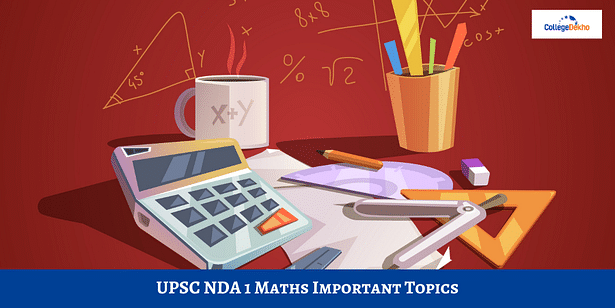The most important topics for UPSC NDA 2024 Mathematics include Algebra, Calculus, Trigonometry, Matrices and Determinants, Vector Algebra, Integral Calculus, etc. Check the list of most important topics for UPSC NDA (1) 2024 Mathematics & preparation tips below.
- UPSC NDA 1 Maths Syllabus 2024 Highlights
- UPSC NDA 1 2024: Mathematics Topics Distribution
- UPSC NDA I 2024 Mathematics: List of Most Important Topics
- UPSC NDA I 2024 Mathematics Syllabus
- UPSC NDA I Marking Scheme for Maths
- UPSC NDA I 2024 Mathematics: Preparation Tips
- Best Books to Prepare for NDA Mathematics
- Faqs

List of Most Important Topics for UPSC NDA (1) 2024 Mathematics & Preparation Tips:
The most important topics for UPSC NDA (1) 2024 Mathematics are Algebra, Matrices and Determinants, Calculus, Trigonometry, Vector Algebra, Integral Calculus and Differential Equations, Statistics and Probability, and Analytical Geometry Of Two and Three Dimension. A total of 120 questions will be asked from the Maths section and questions will be framed based on Class 12 curriculum. A candidate's ability to solve Mathematical problems by applying formulas, theorems, etc. will be assessed in this section. The total marks of the Maths paper is 300. In order to prepare effectively for the exam, gain clarity on basic principles, formulas, and theorems before moving on to more advanced problems. It is also crucial to develop a study plan that allocates sufficient time to cover each topic in the NDA Maths syllabus and allow the candidates to focus on weaker areas while also revising their areas of strength regularly.
Questions asked in the Algebra section are usually easy. Since maximum questions are formula & result-oriented, candidates must remember all the important results of complex numbers (cube root of unity, conjugate, etc.), Binomial theorem, and P&C. For Calculus, candidates should develop a good understanding of graphs & how to use them in order to answer questions based on Application of derivatives, differentiation, definite integral, Area under the curve, etc. To acquire maximum marks in the Co-ordinate Geometry section, candidates should focus on chapters like Vectors, complex numbers, and 3-D.
Checl also:
UPSC Exam Calendar 2024 - All Important Dates
UPSC NDA 1 Maths Syllabus 2024 Highlights
Candidates can check below the highlights of the NDA syllabus 2024.| Parameters | Details |
|---|---|
Name of the Exam | National Defence Academy Exam or NDA exam |
Exam Conducting Body | Union Public Service Commission, UPSC |
Frequency of NDA Exam | Two times a year (NDA 1 & NDA 2) |
Selection Process |
|
Mode of exam | Offline (Pen and Paper mode) |
Total Marks for NDA Maths | 300 Marks |
Total No. of Questions | 120 questions |
| Marks for Each Correct Answer | +2.5 marks |
Negative Marking | -0.83 marks |
Exam Duration | 2 Hours 30 Minutes |
UPSC NDA 1 2024: Mathematics Topics Distribution
Topics | Number of Chapters | No. of questions | Total Marks |
|---|---|---|---|
Algebra | 11 | 40 | 100 |
Trigonometry | 05 | 20 | 50 |
Calculus | 10 | 20 | 50 |
2D and 3D | 08 | - | 10 to 15 |
Statistics and Probability | 03 | 10 | 25 |
UPSC NDA I 2024 Mathematics: List of Most Important Topics
Algebra, Matrices & Determinants, Trigonometry, Analytical Geometry of Two and Three Dimensions, Differential Calculus, Integral Calculus and Differential Equations, Vector Algebra, Statistics and Probability are all included in the NDA Mathematics Syllabus 2024. The maximum score for Paper 1's Mathematics assignment is 300. The preparation and output for this article must be improved by constant practice and committed efforts. To answer these questions in the allotted time and deliver the necessary answers, the applicants must maintain accuracy and speed. The topics of UPSC NDA 1 Mathematics are given below in the table along with their most important chapters.
Topic | Most Important Chapters | |
|---|---|---|
Chapter Name | Minimum average number of questions from each chapter | |
Algebra (No. of Chapters: 11) (No. of Important Chapters: 05) | Quadratic Equations | 4 |
Complex Numbers | 4 | |
Matrices | 4 | |
Determinants | 3 | |
Permutations and Combinations | 3 | |
Trigonometry (No. of Chapters: 05) (No. of Important Chapters: 01) | Ratios and Identities | 10 |
Calculus (No. of Chapters: 10) (No. of Important Chapters: 03) | Functions | 6 |
Applications of Derivatives | 6 | |
Indefinite Integrals | 3 | |
2D and 3D (No. of Chapters: 08) (No. of Important Chapters: 02) | Straight Lines | 5 |
3D | 4 | |
Statistics, Probability, and Binary Number (No. of Chapters: 03) (No. of Important Chapters: 02) | Statistics | 8 |
Probability | 8 | |
Total No. of Chapters | 37 | |
Total No. of Important Chapters | 13 | |
By going through the table above, you must have noticed how drastically the number of chapters has reduced, almost a third of the total. If you count the total questions, they cover a minimum of 69 questions out of 120.
UPSC NDA I 2024 Mathematics Syllabus
UPSC NDA Exam 2024 comprises 2 papers - Mathematics and General Ability Test (GAT), wherein both papers will have Objective Type Questions. There will be a total of 270 questions for a total of 900 marks. 120 questions will be allotted for the Mathematics paper, while 150 questions for GAT. The NDA syllabus for Paper 1 comprises topics and sub-topics from Maths. This paper will carry 120 questions from Class 10, 11, and 12 standards. Candidates will be awarded with 2.5 marks for each correct answer and there will also be a negative marking of 0.83 marks for each incorrect answers.The standard of the NDA Mathematics question paper is set based on Class 11 and 12 levels. This section tests the candidate's calculative skills. Let us look at the topic-wise NDA Mathematics syllabus.
| Topics | Sub-Topics |
|---|---|
Algebra | Sets, Venn Diagrams, De Morgan laws, Cartesian product, relation, equivalence relation. Real numbers, Complex numbers, Modulus, Cube roots, Conversion of a number in Binary system to Decimals and vice-versa, Arithmetic, Geometric and Harmonic Progressions, Quadratic equations, Linear inequations, Permutation and Combination, Binomial theorem and Logarithms, Binary System, Equivalence Relation, Cube root of unity, 2-D and 3-D Vectors, Magnitude and direction, Unit and null vectors, Vector Addition, Scalar multiplication of vectors, etc. |
Calculus | Concept of a real valued function, domain, range and graph of a function. Composite functions, one to one, onto and inverse functions. Notion of limit, Standard limits, Continuity of functions, algebraic operations on continuous functions. Derivative of function at a point, geometrical and physical interpretation of a derivative-application. Derivatives of sum, product and quotient of functions, derivative of a function with respect to another function, derivative of a composite function. Second order derivatives. Increasing and decreasing functions. Application of derivatives in problems of maxima and minima |
Matrices and Determinants | Types of matrices, operations on matrices. Determinant of a matrix , basic properties of determinants. Adjoint and inverse of a square matrix, Applications-Solution of a system of linear equations in two or three unknowns by Cramer’s rule and by Matrix Method. |
Integral Calculus and Differential Equation |
|
Trigonometry | Angles and their measures in degrees and in radians. Trigonometric ratios. Trigonometric identities Sum and difference formulae. Multiple and Sub-multiple angles. Inverse trigonometric functions. Applications-Height and distance, properties of triangles. |
Vector Algebra | Vectors in two and three dimensions, magnitude, and direction of a vector . Unit and null vectors, the addition of vectors, scalar multiplication of a vector, scalar product, or dot product of two vectors. Vector product or cross product of two vectors. Applications—work done by a force and moment of a force and in geometrical problems. |
Analytical Geometry Of Two and Three Dimension | Rectangular Cartesian Coordinate system, Distance formula, Equation of a line in various forms. The angle between two lines. Distance of a point from a line. Equation of a circle in standard and in a general form. Standard forms of parabola, ellipse, and hyperbola. Eccentricity and axis of a conic. Point in a three-dimensional space, the distance between two points. Direction Cosines and direction ratios. Equation two points. Direction Cosines and direction ratios. Equation of a plane and a line in various forms. Angle between two lines and angle between two planes. Equation of a sphere. |
Statistics and Probability |
|
UPSC NDA I Marking Scheme for Maths
Applicants get 2.5 marks for each correct answer, and 0.83 marks are deducted for each incorrect answer. Applicants can view the marking criteria and the total number of questions below.Total Marks | 300 Marks |
|---|---|
Total No. of Questions | 120 |
Correct Answer | 2.5 marks |
Marks deducted for the wrong answer | - 0.83 |
Total duration of Mathematics Paper | 2 Hours 30 Minutes |
UPSC NDA I 2024 Mathematics: Preparation Tips
If maths hasn’t been your best buddy until now, some quick tips given below can surely fix that.
-
Most important is to make a formula book. Just write down quick important notes and formulas as you prepare. This saves a lot of time stifling through pages upon pages at the time of revision.
Try not to depend on the list of formulas given in a book. Not only does one time writing equal five times reading, making it more personal would help you remember better unless you’re extremely familiar with the book-listed formulas. That way, you’d confuse your brain and no one wishes that. - Solve Model Question Papers and Previous Years’ Question Papers by fixing a timer. This helps improve your speed and as is known, time is the essence of everything.
- Follow only the most known and most used books for UPSC NDA 1 Exam while preparing.
- Clear out the basics first.
- Don't take all topics you are not good at in one sitting. Rather, choose topics in a sequence that you can handle. The confidence boost that easy topics give us is invaluable many a times.
-
One of the advantages of having an MCQ-based exam is that you don’t have to go the old school way, knowing step by step procedures, writing some easy-made assumptions, etc. Learn shortcuts! Practice shortcuts! There’s nothing that would work better.
In many MCQ books, shortcuts are generally listed. Comprehend them in a way that’s comfortable to you and put them down in your formula book.
Best Books to Prepare for NDA Mathematics
If you want to strengthen your fundamental mathematical concepts and revise the important topics to prepare effectively for the NDA Maths exam, refer to the best books mentioned below:
Book Title | Author/Publisher |
|---|---|
Study Package Mathematics NDA/NA Entrance Exam | Arihant |
Path Finder for NDA and NA National Defense Academy/Naval Academy Entrance Examination | Arihant |
Mathematics for NDA and NA: National Defense Academy and Naval Academy | R S Aggarwal |
Quantitative Aptitude for Competitive Examinations | R S Aggarwal |
NDA Mathematics (Hindi) | RPH Editorial Board |
NDA and NA Entrance Examination: Previous Solved Papers | R. Gupta |
Mathematics Textbook for Class XI & XII | NCERT |
Union Public Service Commission (UPSC) conducts the NDA (National Defense Academy) exam twice every year. The selection process involves a written exam and SSB Interview. The application window for the NDA 1 2024 Exam ended on
January 9, 2024, till 6 pm
. The NDA 1 2024 exam will take place on
April 21, 2024
. The UPSC issued the NDA 1 admit card 2024 on
April 12, 2024
tentatively. For the second session, UPSC will release the application form from
May 2024
.
Need some more tips? Read:
Tips to Crack UPSC CDS, NDA, and NA in the first attempt.
If you believe you’re better armed now, we wish you luck, and for more such tips and topics, be sure to check out CollegeDekho!
Are you feeling lost and unsure about what career path to take after completing 12th standard?
Say goodbye to confusion and hello to a bright future!

FAQs
The qualifying marks for each section of the written exam are a minimum of 25%. It is the same for all the candidates irrespective of their categories.
The important topics covered in NDA Maths syllabus 2024 are Matrices and Determinants, Sets, Venn Diagram, Trigonometry, 2D and 3D Geometry, Differential calculus, etc.
The UPSC NDA exam will be conducted offline. It is a pen-paper-based exam consisting of MCQ-type questions.
The recommended books for UPSC NDA Maths are given below:
- Mathematics for NDA and NA: National Defence Academy and Naval Academy by RS Aggarwal
- Quantitative aptitude for competitive examinations by RS Aggarwal
Was this article helpful?


















Similar Articles
FYJC 3rd Merit List 2025: Release Date Out, Seat Allotment
HTET 2024: Exam Date (July 30-31), Admit Card (Out), Syllabus, Exam Pattern & Latest Updates
TS TET 2025: Result (Out), Direct Link to Check TGTET June Results at tgtet.aptonline.in
UGC NET Geography Cut off 2025 for June (Out)- Check Category wise cut off for JRF, PhD, Assistant Professor
FYJC 11th Merit List 2025: Admission Cutoff & Seat Allotment
IIT Ropar ITEP Admission 2025: Dates, Admission Merit List, Fees, Selection Process